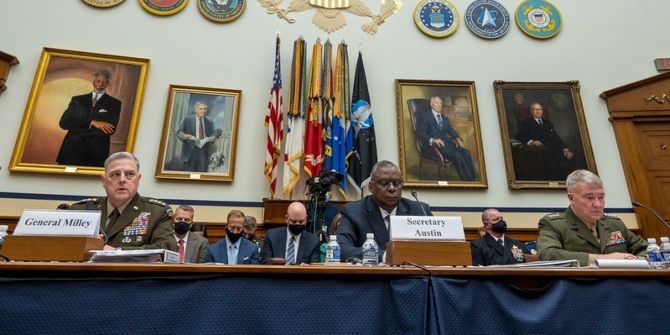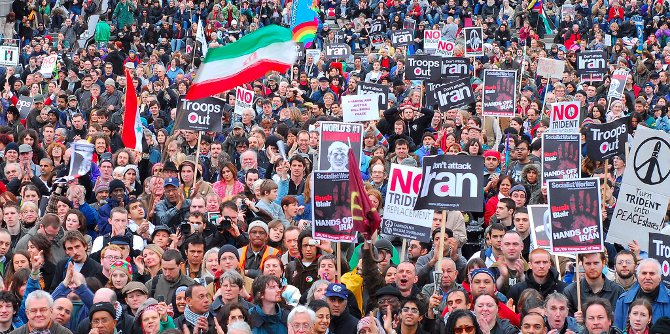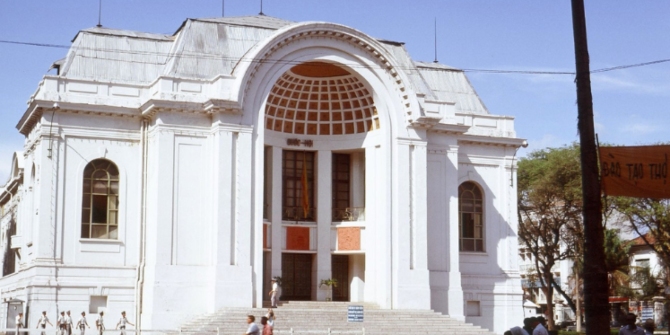In Archives of the Insensible: Of War, Photopolitics and Dead Memory, Allen Feldman looks at the relationship between contemporary forms of warfare, violence and political visuality through a range of examples included the Combatant Status Review Tribunal (CSRT) of Guantanamo prisoners (2004-07) and South Africa’s Truth and Reconciliation Commission (TRC). This book is highly recommended by Melany Cruz for persuasively showing how notions of sovereignty can be used to align justice, human rights and democracy with political violence in its physical, symbolic and structural forms.
Archives of the Insensible: Of War, Photopolitics and Dead Memory. Allen Feldman. University of Chicago Press. 2015.
‘Tonight we are a country awakened to danger and called to defend freedom. Our grief has turned to anger, and anger to resolution. Whether we bring our enemies to justice or bring justice to our enemies, justice will be done.’
These words were part of one of George W. Bush’s speeches after 9/11, establishing the starting point of the ‘War on Terror’. Besides the many animosities that Bush’s speeches could produce in society, this particular sentence gives us an interesting beginning to introduce the relevance of Allen Feldman’s book, Archives of the Insensible: Of War, Photopolitics and Dead Memory.
Bush states the necessity of securing sovereignty over external enemies through processes of justice that help it to defend (western) democracy, freedom and human rights. Bringing about this justice has meant the creation of new technologies, new laws and new narratives about war and enemies. Therefore it is in this context that Feldman challenges, through seven episodes, contemporary narratives of war and violence as regimes of truth that have justified the securitisation of society. Through a thoughtful researching of archives, he draws on specific social stories to critique the ‘returning sensibilities and insensibilities of warfare’ (22) to show how war produces different forms of inhumanity that are enclosed in these reports. Feldman explores the anthropological forms by which the state maintains sovereignty through physical, symbolic and structural violence. I will pay particular attention to two of those archives that are interconnected to some extent.
Feldman begins by exploring the Combatant Status Review Tribunal (CSRT), which reviewed 558 cases of Guantanamo prisoners between 2004 and 2007. Within these cases, Feldman exposes Ashraf Salim’s case as one of the most controversial, since he questioned and contested the denegation of classified information regarding his case. Particularly, it is argued that the processes conducted by the CSRT, and specifically the denegation of information, represent a structure of justice whereby some subjects are pushed out of legal and democratic boundaries. In this case, Salim clashed with an apparatus that Feldman denominates as ‘deliberate political vertigo’ (41), which occurs as a collision of asymmetrical forces.
Feldman’s argument is constructed through details of the conversation between Salim and the tribunal during the trial, which enriches understandings of violence beyond its material and physical conditions. In this sense, violence seems to take the shape of a ceremony that reproduces certain narratives to justify the ‘War on Terror’, such as the securitisation of justice and the criminalisation of certain subjects.
In comparison with Kafka’s short story, ‘Before the Law’ – contained within his novel The Trial – Feldman states how Salim, akin to the countryman in the story, was confined by the house of law, symbolically trying to cross infinite gatekeepers just to realise that his fate was already decided and that the process, the trial and the judgment did not have distinction. As with Kafka’s gatekeepers, the CSRT had decided beforehand that Salim was guilty, without any right to understand fully how he was judged.

Image Credit: The facility used for Combatant Status Review Tribunals for detained enemy combatants at Guantanamo Bay, Cuba (29 July 2004) (PH1 Christopher Mobley, Wikipedia Public Domain)
Exposing the second archive of the insensible towards the end of the book, Feldman explores South Africa’s Truth and Reconciliation Commission (TRC) through two main approaches: 1). as an archive of truth that aimed to establish a finitude point within transitional justice; and 2). as a frame in which is possible to understand the apartheid structure through the bestialisation of the black population.
Within the context of the South African reconciliation process, the TRC played a significant role in seeking justice and an endpoint for the apartheid period, in which many cases of amnesty arose among police agents who had participated in processes of killing and torture. The narrative that predominated within the TRC was that those police conducts were enacted by ‘bad apples’, an individual behavioural and moral pathology in certain police agents. This particular language is found in several examples in the chapter which helps Feldman to draw out his main argument: the normalisation of structural state violence based on racism. In this sense, the self-claimed transparency and possession of the TRC represented an apparatus through which the state created a post-apartheid narrative controlling violence and its meanings.
In this sense, Feldman argues, in a state’s racialised violence, there is a regime of truth about violence itself that reproduces forms of knowledge and meanings, becoming ‘itself both the only archiving archive and the archived event’ (241). This will of truths permits the state to establish ‘reconciliation’ among the South African population, marking an endpoint to the apartheid period. Feldman shows how the TRC represents a project that fashioned democracy and a culture of human rights that left out all political discussion about the racialised forms of domination and the exploitation of the black population.
This is linked with Feldman’s second point in this chapter. The TRC’s archives showed recurrent declarations of anti-apartheid activists of the use of the words braai and braaiing – Afrikaans for barbecue – among police agents during torture and interrogation processes. Exploring these terms, Feldman exposes how braai was code for the murder and torture of the black population, as a language assimilation of common barbecue practices of relaxation and alcohol consumption among white males in South Africa (260).
Feldman identifies how braai tortures are linked with colonial and postcolonial disciplinary labour practices, such as the slaveholding economy, agrarian tenancy, sharecropping and white agrarian paternalism and the industrial relations of production in the mineral industries (264). These forms of violence were reproduced through policies’ notions of torture in the sense that black subjects have been historically depersonalised and bestialised as an animalised image.
In terms of Hannah Arendt’s banality of evil, Feldman discusses how white policies naturalised a daily practice such as braai as a form of violence and terror that became normality within the apartheid structure. Therefore, the TRC is questioned not only as a space that justifies historical forms of violence, but also for using memory to impose a narrative of ‘democracy’ and ‘human rights’ that leaves political history out of the map.
Archives of the Insensible is highly recommended for its attention upon the details that are confined in archives and for providing a profound understanding of violence. This book also explores dimensions of sovereignty that question universal concepts of democracy, the monopoly of violence and human rights. It could therefore be an interesting book for scholars of International Relations theory, particularly for those studying reconciliation processes and conflict.
This review originally appeared at the LSE Review of Books.
Please read our comments policy before commenting.
Note: This article gives the views of the authors, and not the position of USAPP– American Politics and Policy, nor of the London School of Economics.
Shortened URL for this post: http://bit.ly/1qgvfsw
——————————————–
Melany Cruz – University of Birmingham
Melany Cruz is a PhD Candidate at the University of Birmingham, exploring the phenomenon of criminal violence in Latin America, particularly the experiences of violence in public lynchings in Mexico. She is also interested in studies of decolonial knowledge and the thought of Frantz Fanon. Currently, she is Editor-in-Chief of the journal Encuentro Latinoamericano: Journal of Political Science of IAPSS.






